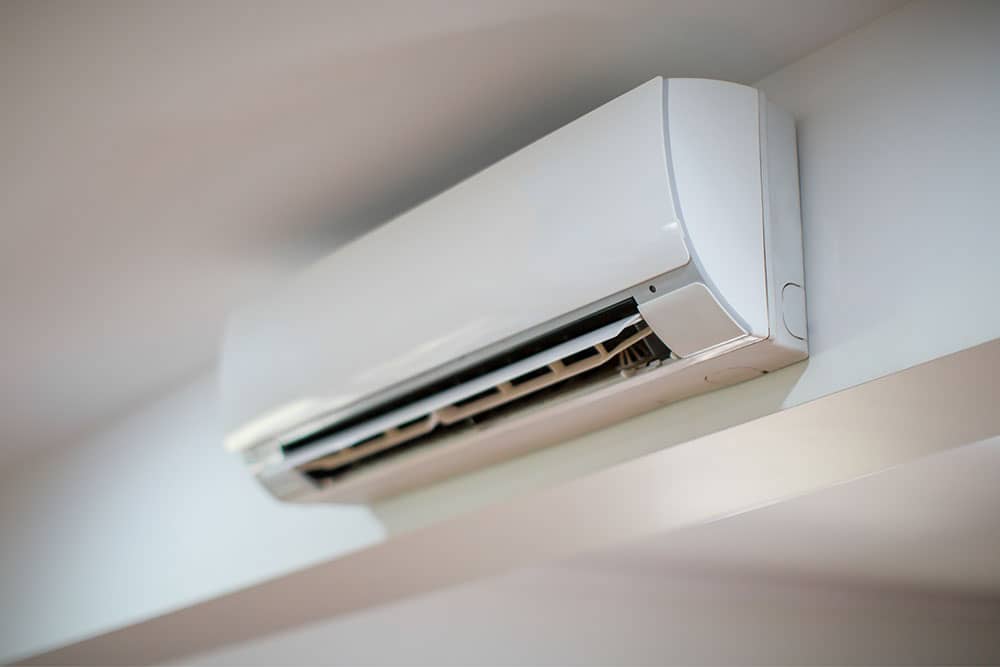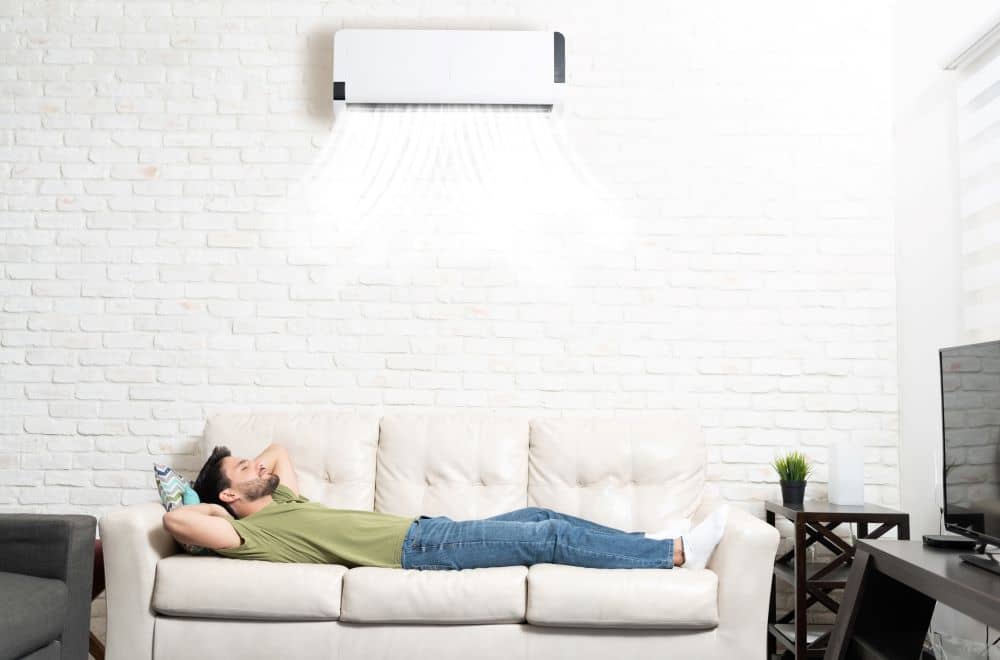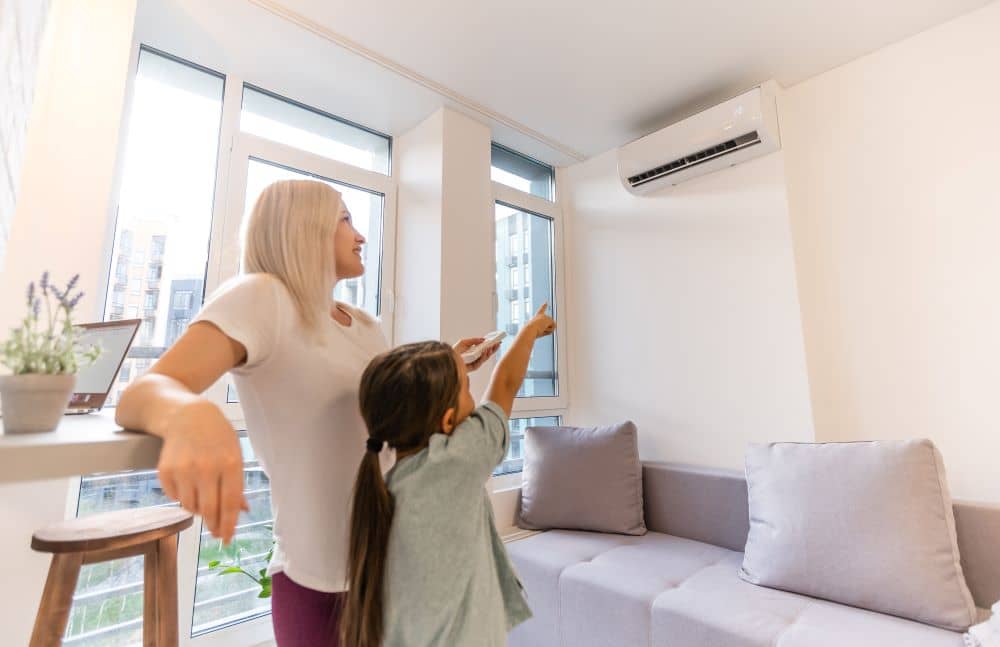Shopping for an air conditioning unit may seem like an easy task. Just pick one of the brands that you trust and a product that fits your budget, right? Unfortunately, it is not that simple. You have many things to consider aside from the brand name and the cost. You should also think about the layout of your house or room, your cooling and heating needs, and which type of AC suits you best.
One of the biggest questions of buyers is whether to choose an inverter aircon or the non-inverter variant. To make the choice, you need to have the very best information possible.
This blog post will help you understand what these types of air conditioning units are, their dissimilarities, and their pros and cons. With these facts, you can choose the better option for you and your home.
What is an Inverter Aircon?
Air conditioners were once considered a luxury item, and therefore, only wealthy families could have them. Time has passed, and technology has changed, making air conditioners more affordable. They are now more energy-efficient, so almost anyone can buy this household staple today. With the AC units, homes, offices, hospitals, and other places feel more comfortable.
Now, let us talk about inverter aircon units. The inverter system is a technology created to get rid of temperature oscillations. Years back, electricity waste was a serious problem. Manufacturers realised there was a need to fix it and turned to the inverter system technology. It is an improved version of the advancements during that time.
Inverters use adjustable speed, which helps control the compressor of the equipment. This way, it can provide the best performance to the user.
Inverter systems work by starting at a low speed. Therefore, it is using much less power at start-up, before slowly increasing until it reaches maximum capacity. Homes do not need to wait for a long time to achieve their desired temperature. Cooling is practical as well since the temperature levels can now be retained. Losses are prevented, and the user enjoys a more even temperature.
How Does an Inverter Aircon Work?
If you have watched air conditioning ads or read about the appliance, you probably know about the term “inverter.” So, what is this technology?
Without getting too technical, inverters control the power frequency supplied to the air conditioner’s compressor motor. This specific motor is responsible for maintaining and controlling the compressor’s rotational speed. The compressor is a part of the aircon that regulates the refrigerant flow and therefore, controls the cooling or heating required.
Perhaps that definition is a little bit confusing, so let us simplify it even more. An aircon’s job is to maintain a room’s temperature, regardless of being an inverter or non-inverter type. It heats and cools a room whenever necessary. Using inverter technology, air conditioning units adjust the temperature of the room by changing the speed of the motor without requiring the motor to turn itself on or off.
In comparison, non-inverter air conditioners have constant motor speeds. The way to adjust the room temperature is to turn the compressor motor on and off. This method consumes more energy.
Think of these two systems as a running man. A non-inverter system is equivalent to a man running fast and then stopping hard, allowing him to rest for a bit before starting and stopping again. This start-and-stop routine is not only impractical but also uses more energy. On the other hand, an inverter type is similar to a man running and maintaining an appropriate speed. It allows him to continue running without wasting energy.
Remember that the key difference is how the motor speed is controlled. In an inverter aircon, the motor operates using electricity and magnets. There are two types of magnets in the motor: one permanent magnet with natural magnetic force and an electromagnet that uses electricity to produce a magnetic force.
In the electromagnet, the electric current’s direction dictates the North and South poles. So, whenever the electric current changes its direction, the N and S poles also change. This is when the motor rotation occurs. The inverter adjusts the speed depending on the direction of the electric current and therefore regulates the motor’s rotation speed.
What is a Non-Inverter Aircon?
The standard air conditioning units are often categorised as non-inverters. The systems possess a lower energy-efficient rating. It may not be easy to distinguish one from the other; however, most reputable brands identify a product as an inverter system.
Non-inverters were more affordable and can still be found in many homes because this was all that was available 20 years ago.
A non-inverter aircon, in its simplest form, is a system with a fixed-speed compressor motor. It works on an “all or nothing” principle, unlike an inverter aircon. This means the compressor will turn itself off and on instead of keeping the same pace all the time.
So, let us say that you set the aircon to 26 degrees. Once the room reaches this temperature, the compressor will automatically turn itself off. The room will eventually reach a higher temperature, which then prompts the motor to start running again to get to the desired temperature. The cycle repeats.
It’s easy to tell that the frequent on and off cycles compel the compressor to work at higher power. That’s why non-inverters are quite noisy whenever they run. Without a doubt, the system consumes more power, making the aircon less energy efficient, especially when compared to its inverter counterpart.
Main Differences between an Inverter and Non-Inverter AC
It is not always easy to figure out if you have an inverter or non-inverter air conditioner. At first glance, these two types do look similar. However, the reality is that they are distinctive from each other in different ways, including their functionality and process. They also come with built-in features, so you may want to know the dissimilarities before buying.
Perhaps the most significant difference between these two types of AC is their compressor.
In a regular AC, the compressor can go on and off. When powered on, it means that this part of the system runs at full capacity. Therefore, it also consumes a lot of electric power. Once the thermostat achieves the set temperature requirement, the compressor will stop working.
The technology also differs. Generally, inverters change the type of power used, which is from alternating current (AC) to direct current (DC) and vice versa. In the world of air conditioners, inverters handle the power supply frequency of the motor. They adjust how the units cool or heat.
There is a variable speed compressor in an inverter AC, which means it is a multi-speed type. Meanwhile, a non-inverter only has one speed, which is fixed at all times. The principle with this product is “all or nothing.” Therefore, it switches on or off whenever required.
Pros and Cons of an Inverter Air Conditioner
One of the best ways to compare these two types of AC units is to check their pros and cons. For an inverter aircon, you can enjoy the following benefits:
- An inverter air conditioner is guaranteed to be energy-efficient. As mentioned above, the compressor slows down and speeds up to maintain the desired temperature. In some cases, the unit’s compressor does not function at its full power. This control gives it the capability to work at variable speeds, which in turn allows the system to be more energy-efficient.
- Since it is not power-hungry, an inverter air conditioner is quieter on start-up – especially if you compare it with a non-inverter AC. The thermostat controls how it proceeds by using the room temperature as its guide. Instead of turning itself on or off abruptly, you will not hear loud humming sounds when it starts and stops. These noises are often the chief complaints of those with non-inverter ACs. Additionally, this controlled process lets the inverter unit use less energy compared to a non-inverter.
- An inverter air conditioner is a good investment. Yes, it is more expensive, but it is more durable, flexible, and functional. You want an AC that will last for several years. This air conditioner type can provide such an advantage to you in terms of energy consumption.
- Faster cooling is yet another benefit that you can get from an inverter-type AC. Since it can run at its rated capacity, the room cools more rapidly.
Although the advantages are great, an inverter AC is not perfect. It comes with a few flaws as well, including:
- It is an expensive type of air conditioner. One reason behind its high price is the use of more advanced technology. Additionally, they are costlier when a professional provides installation services. The parts are also pricey when they need a replacement.
- It is a relatively new technology system. If you need to have the unit repaired, you should first ensure that the person is skilled and qualified for the job.
Weigh in on the advantages and disadvantages carefully to know if an inverter air conditioner fits your requirements, budget, and house plan.
Pros and Cons of a Non-Inverter Air Conditioner
Let us move on to a non-inverter air conditioner. If you have an AC that switches off when the room reaches temperature, it is a non-inverter unit. Meanwhile, if you are still in the market for an aircon, you may be wondering why you should pick this type. Here are the benefits that you can get if you choose a non-inverter AC:
- This type of air conditioner is cheap! It is more affordable than an inverter, which is why it is a consideration for homeowners.
- For Australians who have limited income, a non-inverter aircon is the cheaper option over the inverter variant.
Just like an inverter AC, a non-inverter type also has some cons. Some of these disadvantages include:
- Expect this aircon to be noisier. While many users applaud inverter air conditioners because they are quieter, a non-inverter is the opposite. The noise comes from the fact that non-inverters were built to switch on and off each time they reach the set temperature level. Some homeowners get annoyed with the sound, especially those who are trying to sleep at night or are working.
- Perhaps one of the biggest things that you can complain about this type of AC is that it can die quickly. Its shorter lifespan is a major turn-off to its potential buyers. People these days have become more interested in ensuring that the product will last them for several years. If it continues to degrade in performance, it is not a good investment to make.
- Unfortunately, non-inverters have a shorter life. Because of the constant switching from on to off and vice versa, its lifespan suffers. It causes a lot of wear and tear, so the system can give up quicker than expected.
- Electricity bills can go up. It is a higher power-consuming unit that will just shock you when your bill arrives. Continuous or daily use of a non-inverter aircon will only cause your electric charges to skyrocket in the next several months.
You may want to talk to your professional installer first to get a grasp on how you can save money when running a non-inverter aircon.
Which is the Better Choice?
Without a doubt, choosing between an inverter and non-inverter AC can be challenging. You need to consider several factors. We have already outlined the pros and cons of both units above. However, for some consumers, knowing the advantages and disadvantages is not enough.
Let us dig further so you make the correct choice in the end:
Compressor Comparison: Inverter air conditioners change the rotation speed of their compressors. The benefit of this capability is that it provides a better and more accurate way of maintaining the temperature. Therefore, having an inverter air conditioner is like owning an intelligent unit. Cooling stays in the room efficiently without needing to keep the AC running at full power.
In this area, the inverter AC wins.
Efficiency: Inverter AC units have controlled compressor speed. At the same time, their speed can change when required. They are the better choice when you want a unit that can help you save your electricity consumption.
Inverters help in limiting your energy consumption because of how their compressor works. Therefore, it is easy to see why an inverter unit trumps the non-inverter variant.
The process of non-inverters can result in excessive use of energy. You usually end up with unnecessary expenses that you have to pay every billing month. Also, because of the energy efficiency of inverter units, they are regarded as an eco-friendly choice. They can lessen your energy use by up to 46 per cent compared to the non-inverter air conditioner.
Performance: Inverter aircon units are more versatile, thanks to their compressor system. They will function based on the settings for the room and the thermostat. They adjust their processes based on the current temperature in the room. With this versatility, you can conclude that inverter AC units are the winners in performance.
On the other hand, a non-inverter aircon will do a fine job but will operate on a fixed level. When it comes to the cooling power, the inverter air conditioners once again win. It does not mean, though, that a non-inverter AC cannot cool the room efficiently. It functions the way it should, which is why you should consider other factors, too, before you decide.
Cost: The three previous areas above show that inverter air conditioners rule over non-inverter types. However, the value of the systems is another story. Non-inverters are much cheaper, which is why some homes choose them. They do what they are supposed to do. Although they can be noisy and inefficient in saving energy, they perform adequately in cooling any space.
If you are looking for a reason not to purchase an inverter air conditioner, the cost may be the answer. Those with limited budgets may choose a non-inverter because of the initial price of an inverter air conditioner.
Still, you may want to consider an inverter aircon as an investment. Sure, it costs more at first, but it will help you save in the end. The unit will pay for itself in the long run, unlike a non-inverter, which uses more energy.
So, which is the better choice? You can already tell that inverter air conditioning units are the smarter option.
At the end of the day, the goal is to keep everyone in your home cool and comfy. Both an inverter and a non-inverter air conditioner can provide this benefit for you. Amid the heat in Perth, you want a system that you can rely on. While both are useful, it is always better to take advantage of a more advanced unit.
An inverter air conditioner comes with the latest technology. Plus, if you consider the four criteria above, you can see that this type of AC system is better. Most Perth residents will keep using their air conditioner in the summer and outside this season. Think about how frequently you will use the unit, as well as the temperature level that you will primarily set.
Does an Inverter Aircon Really Save Money?
The answer is a resounding “Yes!” When it comes to reliability and better investment choice, you know that an inverter AC is for you. However, a non-inverter aircon is also available. If you do not need to utilise the unit every day or for several hours daily, this type may be a good option. You may not mind the increase in the electric bill so that non-inverters can be a choice as well.
Although the initial cost of the unit may be an issue for you, it is wise to think about other factors that affect the price. Since the inverter type is more durable and can last longer, it may still be the more cost-effective option. Non-inverters can have a shorter lifespan even if you do not intend to run them regularly. They are not built to last, mostly because of their outdated technology. If you want to make sure you get what you pay for, always choose a good brand with comprehensive warranty offers.
But there are some claims about inverter aircon not saving money. That’s also true IF you select the wrong size. Inverter air conditioning units work on variable compressor speeds. That means the lower the speed, the lower the power consumption. That’s when you save on your electricity bills.
Sure, the inverter aircon does the same job as the non-inverter unit when you start it up. However, the difference lies once the set temperature is achieved. The inverter aircon starts slowing down to a speed that allows it to maintain your desired temperature.
If you purchase an inverter aircon that is not the right size for your room, it’s challenging to get to the temperature you set. This results in the aircon running at full speed and power constantly. You do not save money. You probably spend more because your aircon is undersized.
That’s why correct room sizing is so essential. If you’re looking for more tips on how to save money when using your aircon, please read our blog on how to choose the best temperature for your system.
Remember that aircon sizes are rated using horsepower (hp). You can find ½, 1, 1.5 hp and so on. Take note of these sizes, which should match the size of your room. If you have a 10.5 square metre room, we recommend a ½ horsepower aircon. Anything higher up to 14 square metres requires ¾ horsepower. If your room is about 15 to 21 square metres, the aircon should have about 1 horsepower.
Of course, the values above are just a guide. You should consult an aircon specialist to determine the suitable horsepower for your room size.
What about the Environment?
Less power, less environmental damage – that’s what an inverter aircon promises. The technology in inverter air conditioning systems allows them to have lower carbon dioxide emissions.
Another reason why inverter ACs are eco-friendlier is that they use compressors that do not harm the ozone layer. Refrigerants like R410a and R32 are more commonly used. They have been tested to have less impact on the ozone and environment. Reputable brands, such as Daikin and Panasonic, have models that guarantee high efficiency and cooling capacity with low global warming potential.
The inverter technology also can sense sudden changes in room temperature. This capability allows the system to work ahead of time, causing the compressor to go slower or work harder and faster to maintain a balanced airflow.
Suppose you set your room temperature to 26 degrees when it is 40 degrees outside. In that case, the compressor motor immediately works in advance to ensure the desired temperature is achieved. The compressor will then slow down once that happens, keeping the temperature at a constant level. This method, as mentioned in this post, helps you save on running costs.
In general, an inverter unit can save you anywhere from 30% to 50% electricity compared to non-inverters. It’s easy to see why an inverter aircon is an intelligent choice for people who care for the environment.
But does this mean an inverter aircon will cool down your room slower than a non-inverter? Not at all! It’s a misconception, most likely based on the inverter aircon working as a maintenance machine and not a cooling appliance.
To state it simply, if the room is at 22 degrees, it will stay that way with no displacement whatsoever. The point here is that using a non-inverter aircon means you may not consistently get a 22-degree temperature. The explanation is pretty straightforward. The compressor turns on and off, resulting in the temperatures going down or up one to two degrees, depending on the speed of the compressor. This is not something that you will ever have to worry about with an inverter aircon. Once your room is cool, it stays cool. When you need it to be warm, it stays warm.
Do You Need Help in Making Your Final Decision?
The bottom line is that inverter air conditioning units have many advantages over non-inverter ACs. However, not everyone is happy to pay for the initial cost of an inverter aircon. The energy savings, though, can easily outweigh the hefty price tag.
If you plan to use your aircon for a short while, such as a few hours in the summer, a non-inverter may suit your requirements. However, if you know you will use your aircon for a long time, or you’re just someone who uses the aircon often, an inverter AC is the better option. We recommend it for large rooms, as well.
No matter your choice, you can depend on ACSIS Air to help you with any relevant aircon advice. We also install and provide maintenance services. For more information, contact us, and we can schedule a visit from our expert technicians.




